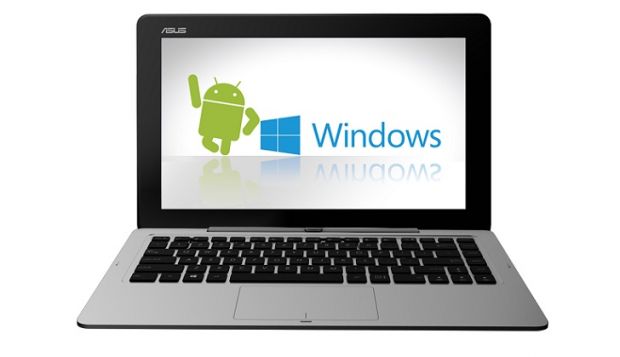All eyes went on ASUS at CES 2014 when the Taiwanese tech giant announced its dual-boot tablet/laptop hybrid, the Transformer Book Duet, which was said to be capable of switching between Android and Windows 8 in a matter of seconds.
But even if shortly after the product was made available for pre-order in select online retail locations in Europe, the Transformer Book Duet has since then been removed everywhere.
Naturally, this fact prompted speculations that seemed to indicate ASUS might be discontinuing the tablet/laptop 2-in-1. At first, the bad guy behind this whole endeavor was apparently Google.
Intel was said to be benefiting the most from the dual-OS partnership bringing Google and Microsoft under the same hood. The chip manufacturer is the only one offering the x86 platform that’s capable of granting support for dual-operating systems and allowing customers to run both Android and Windows 8.
Intel is said to believe that dual-OS tablets will have an impact on the business sector and the chip-maker is one of the most important supporters of the Transformer Book Duet.
Microsoft on the other hand was supposedly happy with the project, as it was said that dual-OS tablets could help the company increase adoption of its Windows 8 operating system, which currently has only a meager 3% tablet market penetration.
But recent information indicates that this is not the case at all, as Microsoft and Google have partnered up to push for the demise of the dual-boot machine. And it’s final. More than that, ASUS might not be forced to pull the plug on its ASUS Transformer Book Duet, but on already existing dual-OS devices like the Transformer P1801 desktop computer.Word on the street has it that Microsoft is planning a major overhaul of its Windows platform, which includes the addition of support for Android apps that would be able to run on the traditional PC just like any existing Metro apps.
Running Android apps on Windows is already possible thanks to BlueStacks, but by the looks of it, Microsoft is actually trying to make this a native Windows feature.
Some have claimed that ASUS is actually pulling the plug on the Duet project due to some anti-dual-boot policy at Microsoft, and it’s possible that Redmond has already sent a memo to clarify the situation to OEMs. The bottom line seems to be pretty clear. If you want to get marketing money off Microsoft, you’ll do so only for devices running Windows 8.
The same goes for Google and its Android platform. It could be argued that dual-boot devices are just too confusing for the average customer and that might be right at some level. But more advanced users will be certainly missing out.Nevertheless, all is not lost in the dual-boot wonderland. Yesterday I was telling you that Chinese manufacturer Ramos was still moving along as planned, heading towards its scheduled March 20 event in Beijing to be held at the Jing Park Art Center, where it will apparently pull the veil off its dual-boot i10 Pro tablet.
How does this reconcile with recent information I don’t know, so I guess we’ll have to wait and see until the above-mentioned date to see what happens, but my feeling is that Ramos won’t be launching the device and they will come up with an excuse.
However, the fact that we will most likely not see Android-Windows 8.1 tablets shouldn’t discourage us from thinking beyond. For example, Ubuntu Linux developer Canonical is working on software that will allow users to dual-boot Ubuntu and Android.
Paradoxically, rumor has it that some companies are gearing up to release dual-boot Android and Windows Phone smartphones and apparently, Microsoft doesn’t have a problem with that. Nor does Google. The truth is certainly somewhere out there.

 14 DAY TRIAL //
14 DAY TRIAL // 



